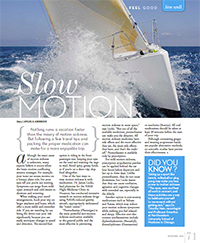 Nothing ruins a vacation faster than the misery of motion sickness. But following a few travel tips and packing the proper medication can make for a more enjoyable trip.
Nothing ruins a vacation faster than the misery of motion sickness. But following a few travel tips and packing the proper medication can make for a more enjoyable trip.
Although the exact cause of motion sickness is unknown, many experts believe it occurs when the brain receives conflicting sensory messages. For example, your inner ear senses motion on a bumpy plane ride, but your eyes tell you you’re not moving. Symptoms can range from mild upset stomach and cold sweats to dizziness and vomiting.
When making your travel arrangements, book your trip on larger airplanes and boats, which offer a more stable and smoother ride. If you are traveling by car, being the driver cuts your risk significantly because you can easily anticipate changes in speed and direction. The second best option is riding in the front passenger seat, keeping your eyes on the road and resisting the urge to read. Avoid spicy, greasy foods, or if you’re on a short trip, skip food altogether.
One of the best ways to treat motion sickness is with medication. Dr. James Locke, lead physician for the NASA Flight Medicine Clinic in Houston, has conducted extensive research on motion sickness drugs using NASA’s reduced gravity aircraft, appropriately nicknamed the “vomit comet”.
“Promethazine (Phenergan) is the most powerful anti-motion sickness medication available to the general public and the most effective in preventing motion sickness in Space,” says Locke. “But out of all the available medicines, promethazine can make you the sleepiest. All motion sickness medicines have side effects and the more effective they are, the more side effects they have, and that’s the tradeoff.” Promethazine is available only by prescription.
For mild motion sickness, prescription scopolamine patches can be applied behind the ear four hours before departure and last up to three days. Unlike promethazine, they do not cause drowsiness, but Locke warns that they can cause confusion, agitation and cognitive changes with extended use, especially in the elderly.
Another option is anti-anxiety medications such as Valium and Xanax, which may reduce your motion sickness symptoms while making you feel relaxed and sleepy. Effective over-the-counter antihistamines include diphenhydramine (Benadryl), dimenhydrinate (Dramamine) or meclizine (Bonine). All oral medications should be taken at least 30 minutes before the start of your trip.
Although consuming ginger and wearing acupressure bands are popular alternative methods, no scientific studies have proven their effectiveness.
Did You Know?
Taking up a sport like tennis, volleyball or ping pong may make you less prone to motion sickness. “The eyes, ears and feet all work in concert, and these activities are a way to habituate yourself to movement without getting sick,” says Dr. Timothy Hain, neurologist and professor emeritus at Northwestern University School of Medicine in Chicago.